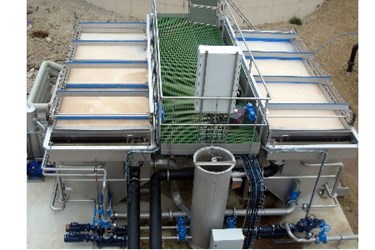Biodiesel Resource Maximised Using DAF Treatment System

- Cheshire biofuel plant sources DAF wastewater treatment from WPL
- DAF system captures more fats, oils and grease for recycling
- Treatment process helps client meet discharge consent
A new energy plant in Cheshire, which processes waste fats, oils and greases (FOG) for use as biodiesel, will use a WPL Dissolved Air Flotation (DAF) wastewater treatment system to reclaim more of the resource. Argent Energy, which already supplies thousands of eco-buses across the UK with the biofuel, has ordered the WPL DAF system for its oil processing plant at Ellesmere Port in Cheshire.
Fats, oils and grease extracted from the wastewater stream by the WPL DAF system will now be returned to the process and used to create more fuel and less waste. The plant, which is currently being built in an industrial area on the Mersey estuary, will process used, waste FOG into the raw material needed to create biodiesel. The FOG is typically sourced from the food and wastewater industries and the resulting oil can be utilised for the manufacture of biodiesel.
Recycling waste
Andrew Haywood, Utility and Industrial Sales Manager of WPL said: “The WPL DAF system will become an integrated part of this brand new biofuel processing plant which is being built on a brownfield site. The DAF system was delivered in February and will be mechanically and electrically installed in April.
“One of the exciting things about being part of this project is that the fats, oils and grease which are separated from the wastewater by the WPL DAF system will be channelled back into the biofuel plant – so the solid waste will effectively be recycled.
“This reflects a trend for fats, oils and grease which are a result of an industrial process to be seen as a resource – rather than just as a problem to be got rid of. WPL engineers have more than 30 years experience of manufacturing these type of plants, which are commonly used in water treatment plants but also have a wide range of industrial uses.”
Highly effective
Argent Energy, is required as part of its planning consent to remove as much of the residual fats, oil and grease as possible from the wastewater discharged into the sewerage network.
The Dissolved Air Flotation system is a very efficient way of separating wastewater from fats, oils, greases and organic matter and removing a high percentage of suspended solids. Engineers from WPL will carry out the installation of the DAF system and the control panel in April 2016 as well as supplying mechanical and electrical training to the technical engineers working for Argent Energy at Ellesmere Port.
The WPL DAF system, with its main components manufactured in stainless steel, is low maintenance and is fitted with numerous testing and sampling points. Once the biodiesel site begins processing later in 2016, tests will take place to ensure the DAF system is removing the highest possible level of solids from the wastewater.
Simon Kimber, WPL Sales and Marketing Director said, “This contract is an important one for WPL as we take on an ever increasing range of projects managing all types of wastewater. However difficult the effluent, we are confident we have the technology to treat it.”
Growth industry
The development of the Cheshire site represents a major expansion for Argent Energy, which currently produces 50 million litres a year of high quality biofuel from its plant in Motherwell. The plant, which is being built over 1.09 hectares at an industrial site at Ellesmere Port was undertaken on an engineering, procurement and construction management (EPCM) basis on behalf of Argent Energy by AECOM, which has previously worked with WPL on projects for Scottish Water and Yorkshire Water.
Argent Energy’s Motherwell works is the only biofuel plant in the UK to use full distillation technology – which results in a very homogenous and clear biodiesel. This fuel is not only blended with standard diesel for retail, but is now used in high bio-blends by bus and truck fleets around the UK who benefit from making large reductions in greenhouse gas emissions.
Source: WPL Ltd
